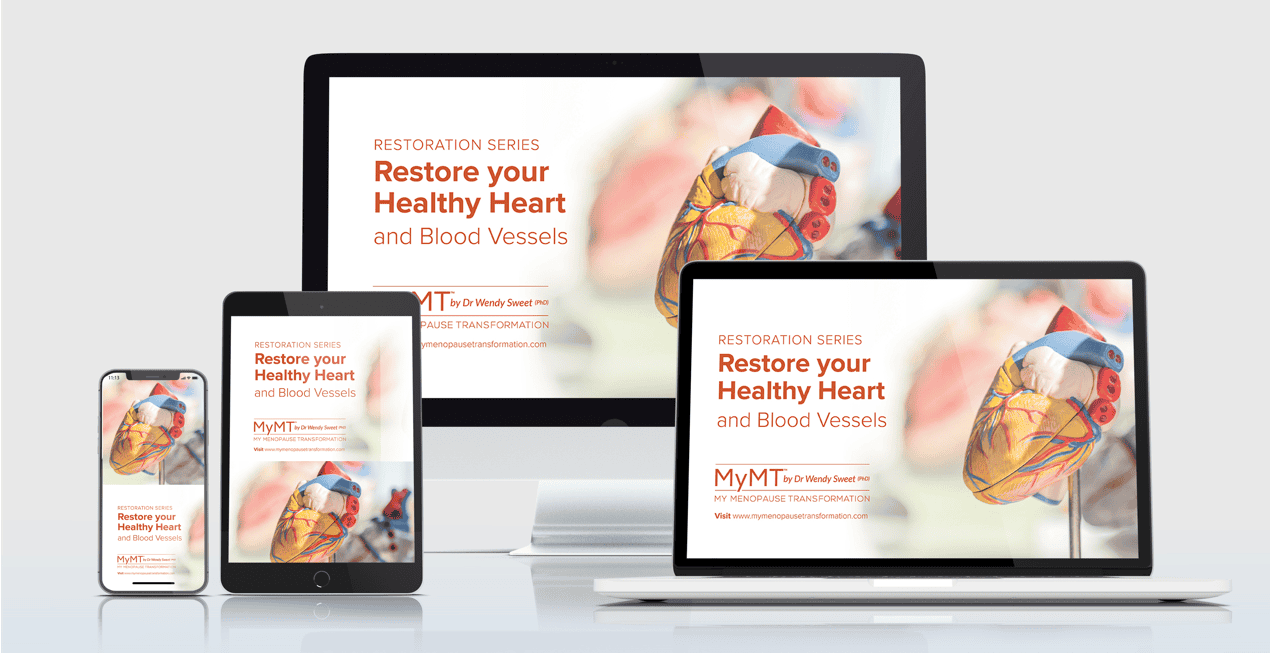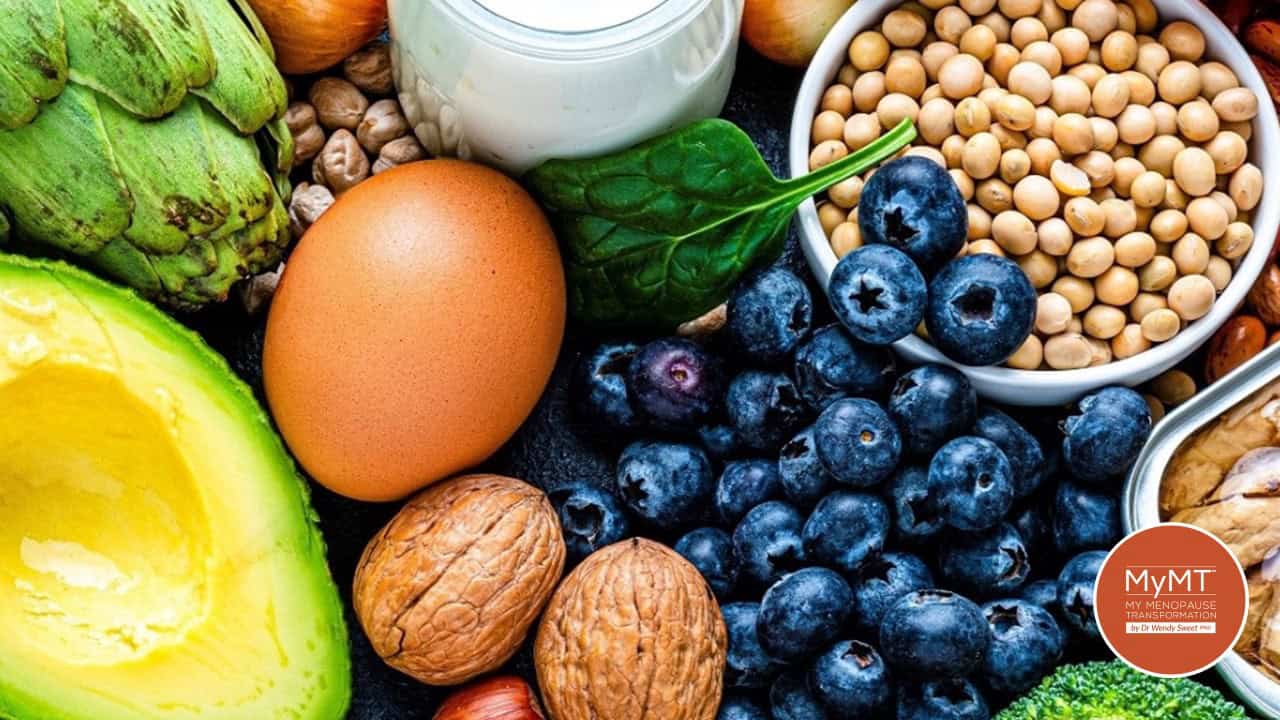When forty obese post-menopausal women in Cairo , aged 50-60 yrs participated in a study exploring the effect of diet and exercise on their cardiovascular health, they would have had no idea how influential it might be on many of us here in my newsletter community.
In a shout-out to these women and the researchers, I want to share the findings with you – because it has relevance to all of us who have found that our weight has been going up and our heart health has been changing as we transition through menopause.
It also backs up the information that I have researched in my quest to get to the bottom of menopause and post-menopause weight gain and changing cardiovascular health as we age. It affected my late-mother and many of her friends, it affected me at first, and it’s currently affecting millions of women around the world.
However, in our menopause weight loss quests, we continue to go on diets that don’t seem to work into the longer term.
As well, many women who I come across in my global community are presented with exhausting exercise programmes from exercise specialists who have little knowledge of menopause and post-menopause weight gain. Many women on my programmes also mentioned that they typically dropped out of exercise activity due to time constraints, low energy, aching joints and muscles as well as poor sleep.
What should we focus on for our weight loss in menopause?
As I’ve learnt myself, through positioning post-menopause weight gain in cardiovascular and women’s ageing research, we can make sense of how we put the brakes on the trajectory of worsening heart disease risk and Type 2 diabetes risk and a condition called ‘Metabolic Syndrome’ which our mother’s generation experienced.
Metabolic Syndrome is an assemblage of several factors including high blood pressure, poor lipid (blood fats) control, insulin resistance and obesity. Menopause is associated with an increase in metabolic syndrome prevalence (Jouvandeh et al, 2015). So, if your waist circumference is higher than 88cm, then this is one clinical diagnosis that is used to determine metabolic syndrome.
High abdominal obesity and hypertension are the most prevalent components of metabolic syndrome as is waist circumference.
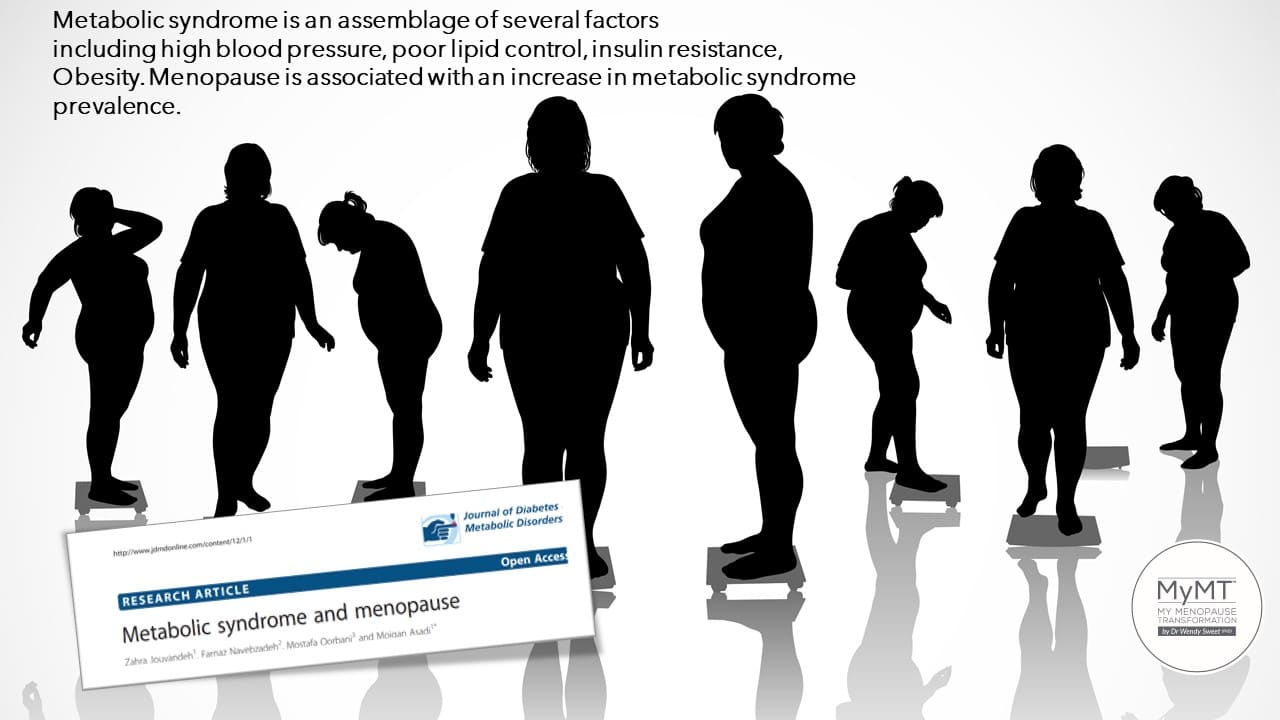
If you are or have put on a lot of weight in menopause and post-menopause, then the new study into the effects of diet and exercise matters. Forty overweight and obese women aged between 50-60 years were divided into two groups. All had high blood pressure and were overweight or obese.
The group was split into 20 women each. One group were on anti-hypertensive medications only, i.e. pills to reduce blood pressure. The other group were assigned to the DASH diet and aerobic exercise in the form of walking on a treadmill with moderate intensity (just slightly puffing) for 30 minutes, 3 days a week for 3 months as well as being on anti-hypertensive medications. (Hanfy, Nashed et al, 2021).
I talk about the DASH diet in my new Heart Health module which is in my 12 week coaching programmes. DASH stands for ‘Dietary Approaches to Stop Hypertension’.
Along with the Mediterranean Diet, the DASH diet is also important for women in menopause. This is because rates of hypertension increase during menopause as oestrogen levels decline. If you’ve been following my articles for a while, then you will have read about the increased incidence of vascular stiffness or the decline in elasticity of blood vessels as we move through menopause.
Interestingly, I’ve read two new books on menopause over the past month written by journalists and neither of them mentioned arterial stiffness. However, oestrogen is known to have a protective effect on our blood vessels (and lymphatic vessels).
As oestrogen declines in production during and after the menopause transition, our blood vessels change and as many of you may have found out already, your blood pressure increases as does your weight, your blood fats (cholesterol) and you are heading towards having to take blood pressure medication and statins or are already on these.
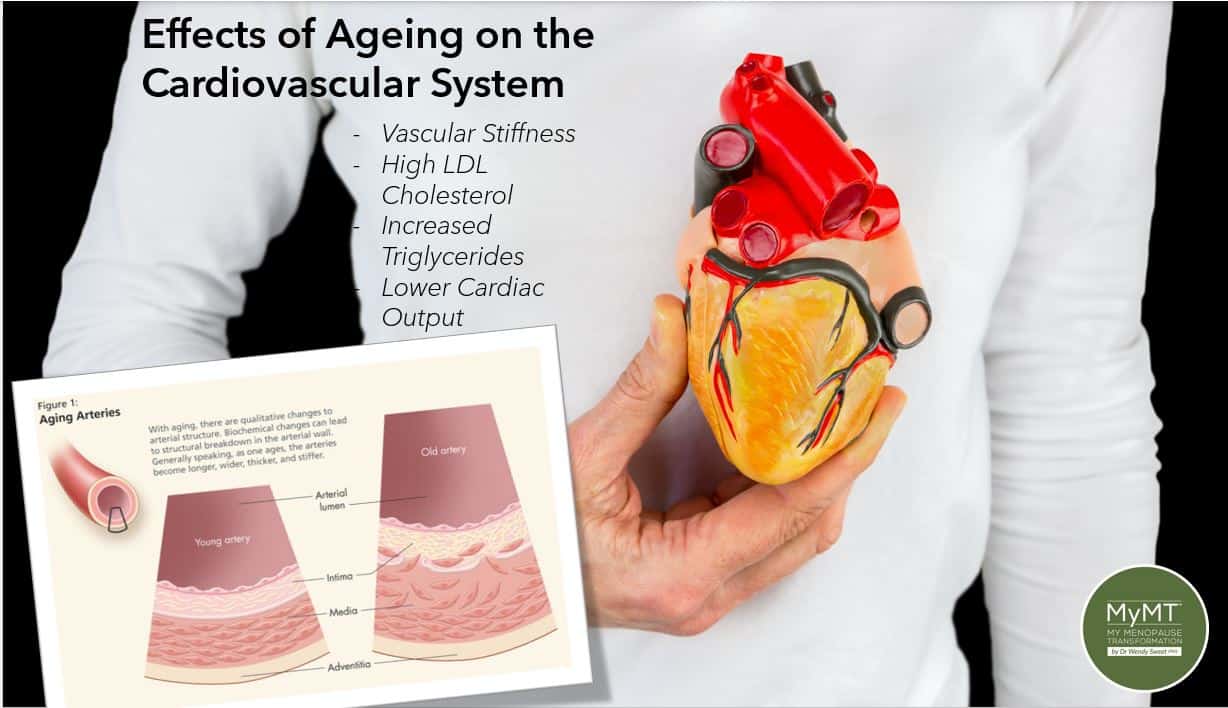
Which brings me back to the ladies in Cairo who participated in this new study investigating the effects of the DASH diet and aerobic exercise on their cardiovascular risk.
The cardiovascular improvements on the group who did the DASH diet and exercise were statistically significant compared to the group who were only on medications. Both systolic and diastolic blood pressure parameters improved as did cholesterol (LDL) and lipids (blood fats). Furthermore, in the diet and exercise group, the ‘good’ cholesterol (HDL) imporved significantly too.
These significant improvements in both blood pressure and blood lipid levels from the DASH diet, were due to several mechanisms the researchers mentioned.
Firstly, the Dietary Approaches to Stop Hypertension (DASH) diet is abundant in fruits and vegetables, it includes low fat dairy products, whole grains, legumes, nuts and small amounts of lean meat and fish. This decreases the total saturated fats and total fat content of the diet.
This is why I’m always telling women to get off the high saturated fat Keto diet if they are already overweight as they move into post-menopause. Our liver can’t handle all the saturated fats. The DASH diet is also low in sodium compared to many modern dietary approaches. Processed foods increase sodium and chloride in the body which in turn may increase blood pressure in susceptible women.
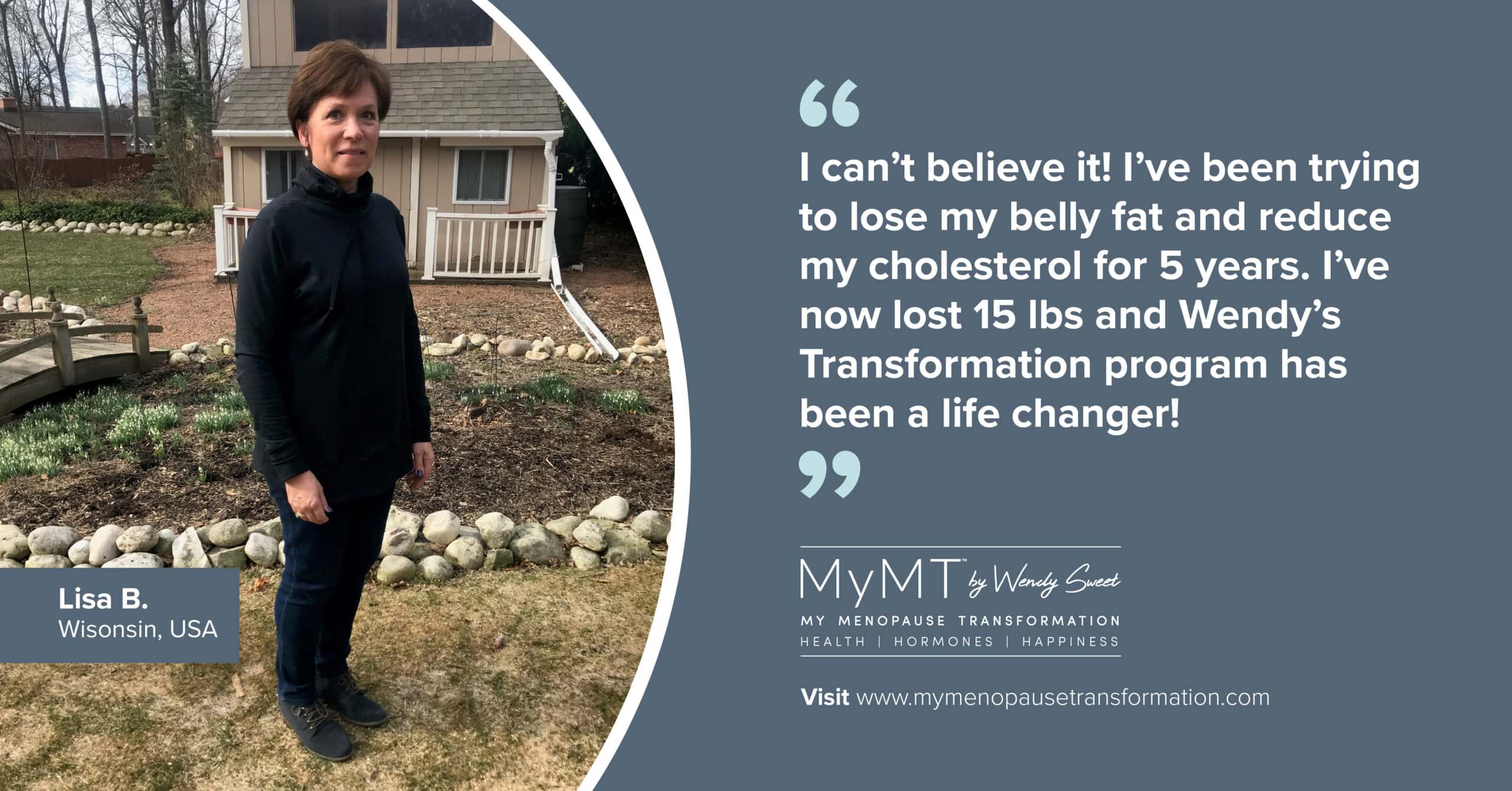
Secondly, the DASH diet is enriched with nutrients that are known to help to improve cardiovascular health as we move through menopause and into post-menopause.
These nutrients include potassium, magnesium, calcium, Vitamin C and soluble fibre with an excess or anti-inflammatory antioxidants. I talk about all of these in my heart-health module for women on my programmes, especially the role of beetroot on improving blood pressure and oxygen uptake into cells during menopause.
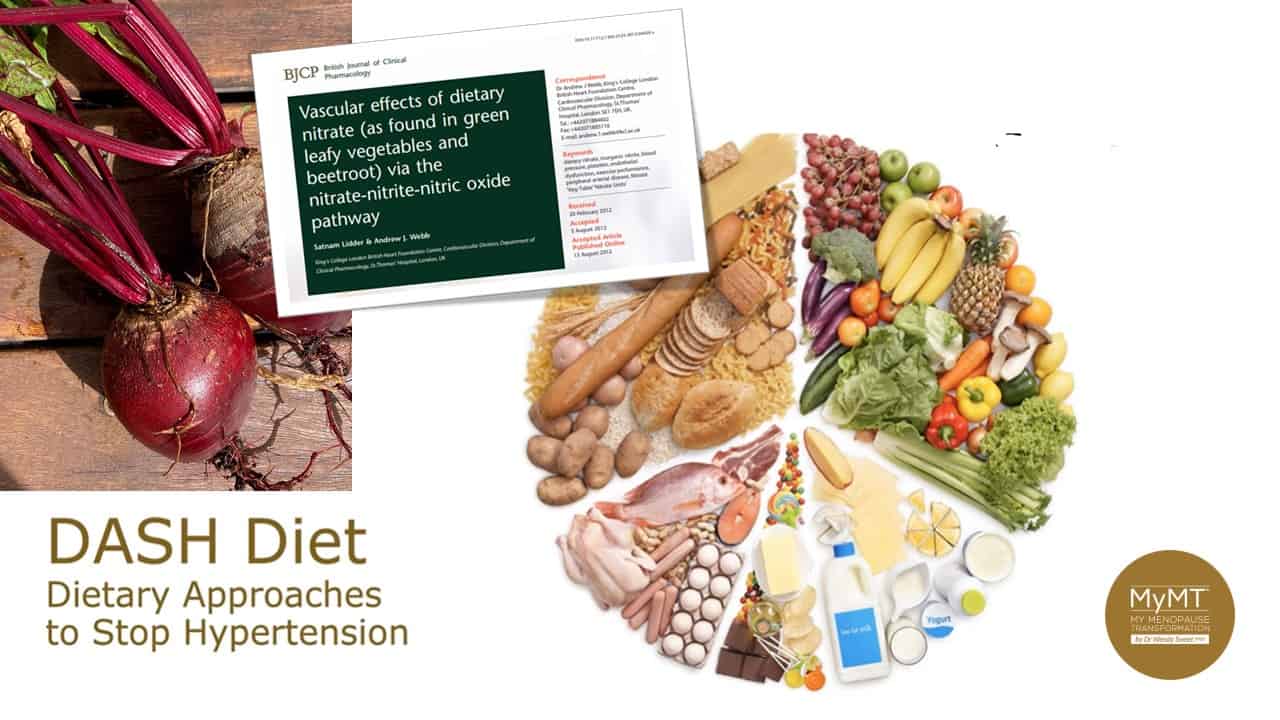
Finally, there was the role of aerobic exercise in the study group who participated in this aspect of the research. Regular exercise is a very effective method to improve both physical and mental health in all women, not just post-menopausal women.
This is because there are very well evidenced known advantages of aerobic exercise on our cardiovascular health and blood vessels as well as in the reduction of blood fat levels and weight.
Women who perform regular aerobic exercise also are known to have less menopause symptoms and adverse effects. This is because exercise positively affects the muscles capacity to utilise insulin, which helps to regulate blood sugar levels. Heart muscle condition is also improved which helps to regulate blood pressure and the right type and amount of exercise helps to reduce anxiety and stress levels.
But too many women may not be undertaking aerobic exercise and instead doing too much higher intensity exercise. Conversely, they may have sore joints, aching muscles and plantar fasciitis, therefore, not be able to exercise for long. I find this has happened to women on my programmes too.
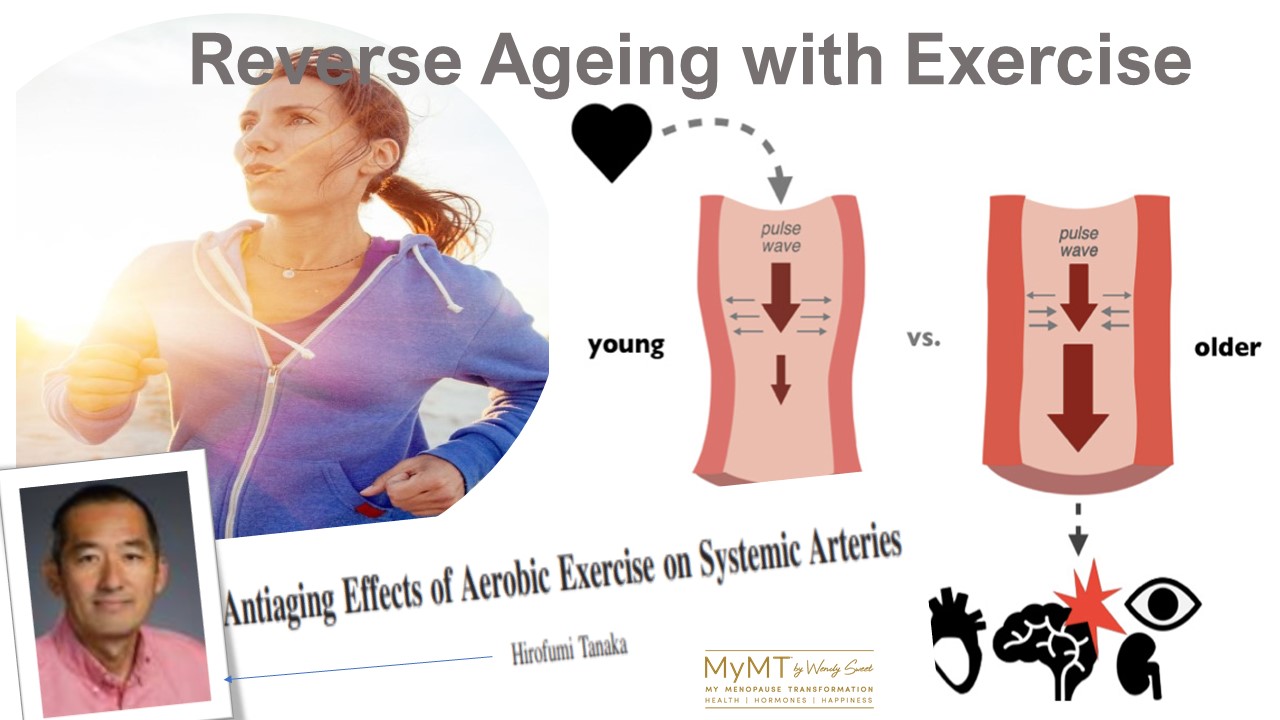
“Exercise should be energising, not exhausting“ is what I told New Zealand journalist Nicky Pelligrino, when she interviewed me for her book called ‘Don’t Sweat It’.
I explained that as women transition through menopause, too much exercise when they aren’t sleeping well, sends them into adrenal fatigue and over-training syndrome.
Whilst the fitness industry, of which I used to be part of, has done a wonderful job of convincing women that they need to exercise intensely to lose weight, I think many of us know that when we always exercise to exhaustion, the weight does not seem to come off, no matter how hard we try.
The reason for this, is that the combination of too much heavy and vigorous exercise and menopause hormonal changes and not sleeping, increases our chronic stress hormone called cortisol. As such, this can send women into worsening heart health, weight gain and high blood pressure at a time of their life when they need to be doing moderate aerobic exercise instead.
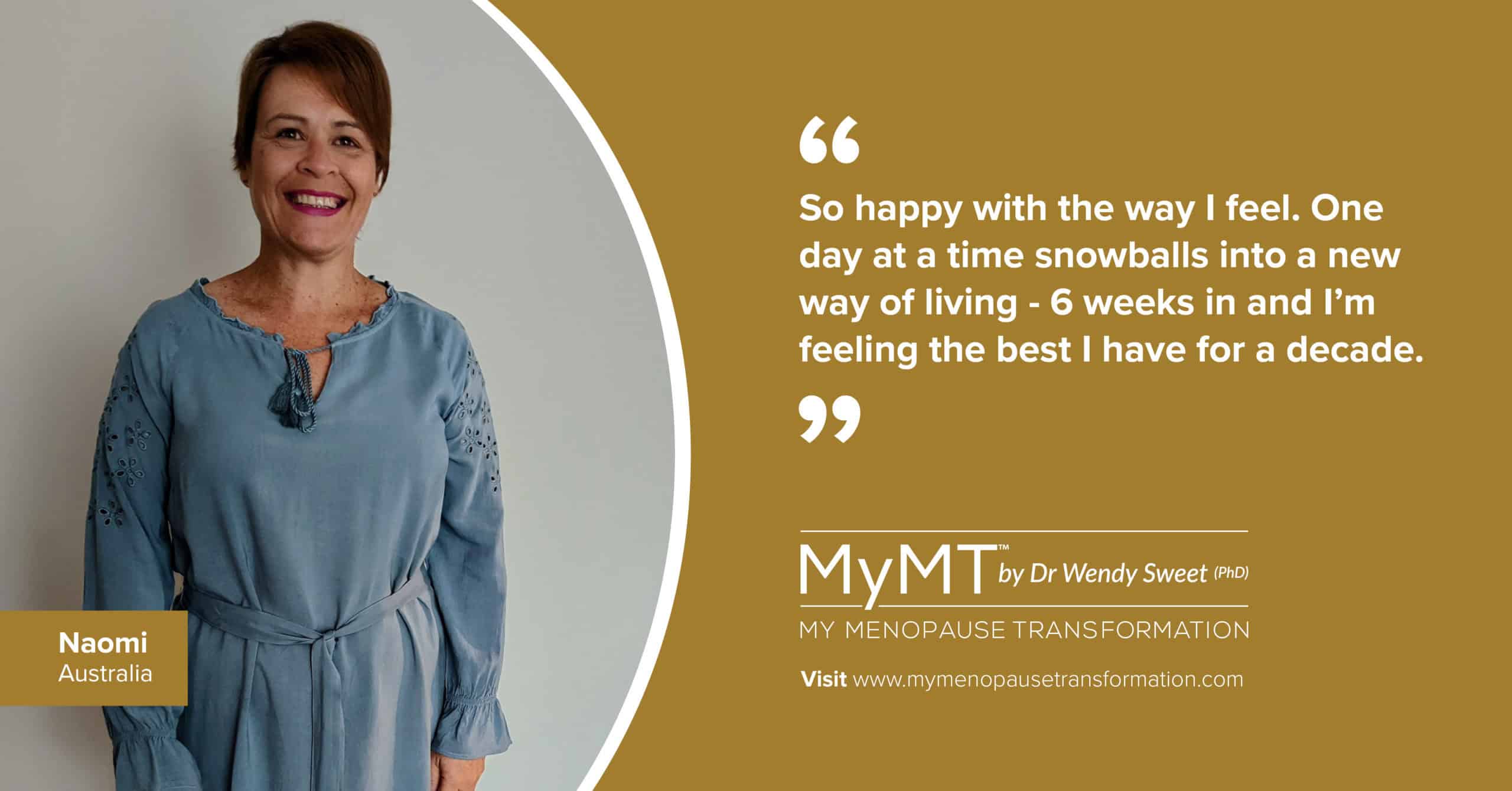
As the first generation of women to come through such incredible changes in our food production and our exercise landscape with the development of the modern fitness industry, never before have we seen so much overweight, obesity, Metabolic Syndrome and hypertension in older women. Numerous population health global studies support this.
But the good news is that it’s never too late to change our health status and I had to do this myself. The DASH diet is in my programmes in my new optional module on Heart Health. And whilst I don’t interfere with any medications women are on obviously, I share with them the lifestyle science that is so important to put into action.
The ability to turn intention into action is also challenging for women in mid-life. We have a lot going on in our lives don’t we?!
I know myself how this can thwart even the best intentions. Which is why I love having my private coaching community – there are over 2000 women in there from around the world and we all help each other to stay focused and on-task with our lifestyle changes.
I hope that if your menopause weight gain or your symptoms are troubling you, then you might join this fabulous MyMT™ community too. Not many women know that as well as my foundation weight loss and symptom management programmes, I also have a 12 week exercise programme designed especially for those of you who want to return to exercise and improve your fitness. Below is a video about it and when you have time, click on the link to how the MyMT™programmes work.
Thank you for being here in my newsletter community.
Dr Wendy Sweet (PhD) Founder of MyMT™ and Member: Australasian Lifestyle Medicine Society.
References:
Alsarah, A., Alsara, O, and Laird-Fick, H. (2015). Women and Heart Disease: Understanding risk factors for coronary heart disease. Women’s Health, 1(1), 1-9
Naitonal Heart, Lung and Blood Institute (Updated 2021). DASH diet and eating plan – https://www.nhlbi.nih.gov/education/dash-eating-plan
Hanfy, H., Nashed, A. et al (2021). The effect of the DASH diet and aerobic exercises on cardiovascular risks in postmenopausal women. J. of Critical Reviews, 8(1), 1-9. ISSN- 2394-5125
Harvard Health Review (2017). Gender matters: Heart disease risk in women. Online: https://www.health.harvard.edu/heart-health/gender-matters-heart-disease-risk-in-women
Patni, R., & Mahajan, A. (2018). The Metabolic Syndrome and Menopause. Journal of mid-life health, 9(3), 111–112. https://doi.org/10.4103/0976-7800.241951
Pelligrino, N. (2022). Don’t Sweat It. Allen Unwin Publ: Auckland, New Zealand.
Wenger N., Arnold A., Bairey Merz C., et al. (2018). Hypertension Across a Woman’s Life Cycle. J Am Coll Cardiol. 24; 71(16):1797-1813. doi: 10.1016/j.jacc.2018.02.033. PMID: 29673470; PMCID: PMC6005390.
